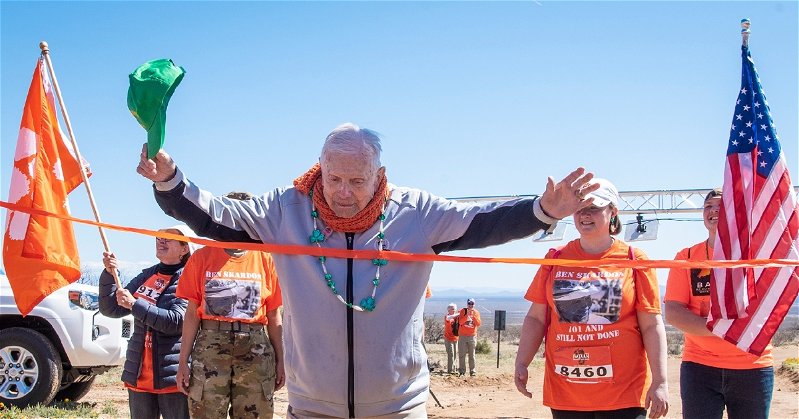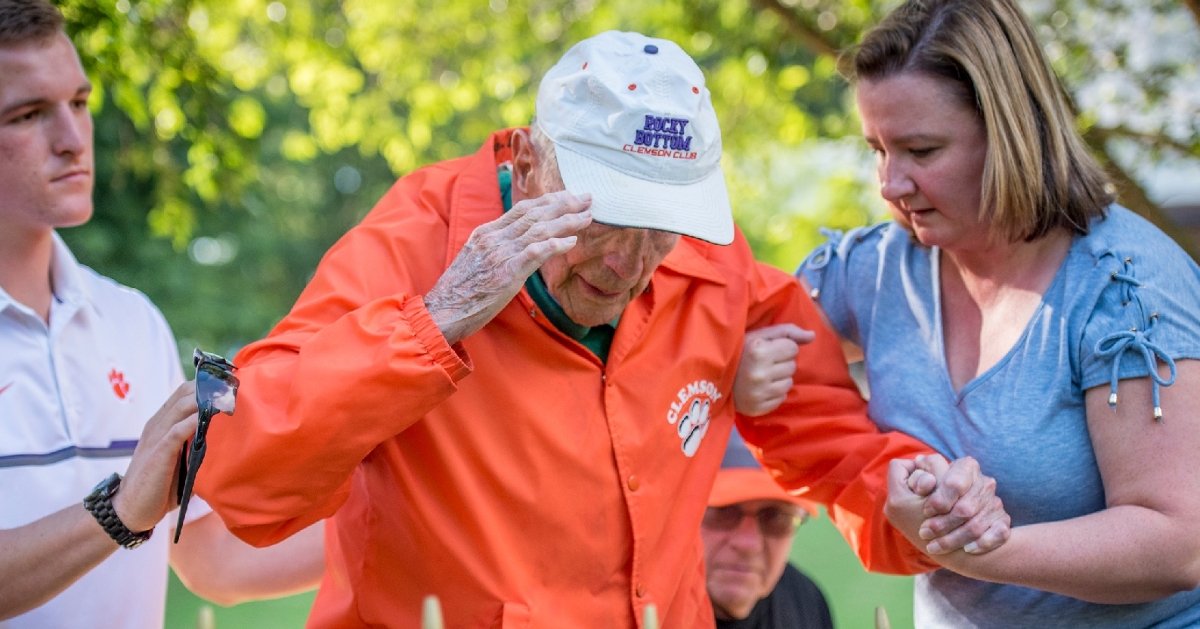
A Life Well Lived: Ben Skardon's life lessons will echo into eternity |
One of the greatest of The Greatest Generation has gone home, and while our lives are poorer in his absence, we are richer for having been graced by his presence.
I received a text message Monday evening informing me of the passing of Colonel Ben Skardon, Class of 1938. Colonel Skardon, U.S. Army (Ret.), passed away on Monday at the age of 104, days after being informed of the approval of his honorary promotion to the rank of Brigadier General. In the minutes that followed, I didn’t know what to do. Feel sad for our loss, the loss of someone we hold with such high esteem? Or to rejoice in the fact that he was now at rest and at peace after 104 years of labor here? It didn’t take long to determine it was ok to feel both ways, and while I’ve shed a tear or two when thinking about Skardon’s legacy and what he means and has meant to so many people, there have been smiles through the tears, and a thankfulness that his was a life well lived. One friend of mine, a certified war hero in his own right, called Skardon a “giant.” Another said that we throw around the word “hero” with too much ease these days and it loses its meaning, that word aptly and correctly describes Skardon and his life. Any visitor into his home was met with a warm smile and those twinkling eyes, eyes that have seen more horror than any of us will ever experience. But those eyes never lost their warmth, and if you sat with him long enough, you might be regaled with poetry or recitals of the classics. And while there was a warmth and a welcoming spirit to Skardon, there was also steel in the timbre of his voice. The first word that I would use to describe him would be iron, but steel is tougher than iron. Iron is an element, while steel is an alloy that contains both iron and carbon and therefore is stronger than iron. Skardon, made of the natural iron that was a result of his upbringing and innate courage, honor, and integrity, saw that iron turn to steel during his time at Clemson and in the US Army, the combination of his own sense of self and the lessons learned along the way turning him into the man that lived to 104 and survived one of the saddest chapters in US history. For those that need a reminder: Following his graduation from Clemson in 1938, he served in World War II as the commander of Company A of the 92nd Infantry Regiment PA (Philippine Army), a battalion of Filipino Army recruits on the Bataan Peninsula in the Philippines. He led his troops through some of the fiercest fighting of the conflict, earning the Combat Infantryman Badge, two Silver Stars, a Bronze Star with “V” device, and a Purple Heart during the first four months of the war. On April 9, 1942, he became a prisoner of war when American troops were forced to surrender to the Japanese. He then endured one of the most notorious war crimes in history: The Bataan Death March. Skardon survived the march and more than three years as a POW, despite becoming deathly ill. Two fellow Clemson alumni, Henry Leitner and Otis Morgan, kept him alive by spoon-feeding him and eventually trading his gold Clemson ring — which he had managed to keep hidden — for food. Leitner and Morgan did not survive the war. Their story is now told at every Clemson Ring Ceremony. As WWII came to an end, Skardon also survived the sinking of two unmarked Japanese transport ships carrying him and other POWs to mainland Japan. Russian units finally freed him in August 1945. He went on to serve in Korea from 1951-52 and retired from the Army at the rank of colonel in 1962. In 1964 he returned to his alma mater, joining the Clemson faculty in the Department of English, where he taught for more than 20 years until his retirement in 1985. I knew that I needed to write something, some sort of tribute, in his honor. But what? Then I realized that nothing I could ever write would ever do justice to the man and to that life well lived. The words of Abraham Lincoln, spoken during the Gettysburg Address, kept echoing in my thoughts as I thought about Skardon, and about his good friends Henry and Otis. But, in a larger sense, we cannot dedicate—we cannot consecrate—we cannot hallow—this ground. The brave men, living and dead, who struggled here, have consecrated it, far above our poor power to add or detract. The world will little note, nor long remember what we say here, but it can never forget what they did here. It is for us the living, rather, to be dedicated here to the unfinished work which they who fought here have thus far so nobly advanced. It is rather for us to be here dedicated to the great task remaining before us—that from these honored dead we take increased devotion to that cause for which they gave the last full measure of devotion—that we here highly resolve that these dead shall not have died in vain—that this nation, under God, shall have a new birth of freedom—and that government of the people, by the people, for the people, shall not perish from the earth. Those words are powerful, and even though they were written and said during the Civil War, they have meaning even today. Nothing I say or write can honor – can consecrate or hallow – the lives of those men, those who survived, and those who perished. For men like Henry and Otis, men who walked Clemson’s campus a final time rested under the shade of her oak trees, and never dreamed it would be the last time. They never dreamed that a foreign nation and its thirst for power would rob them of the chance to come home. Never again would their footsteps fall on what is now Bowman Field, nor would they hear the bells of Tillm,an or the wind rustle through those same oaks on a fall day. But one man remembered their sacrifice. In 2006, at the age of 88, Skardon became the only survivor to walk in the annual Bataan Memorial Death March at White Sands Missile Range, New Mexico. He walked more than eight miles and returned to walk 12 more times, the last when he was 101. He came to consider it a pilgrimage, and his duty to walk in honor of his brothers-in-arms who did not return from the war. And each year, on Memorial Day, Skardon would make the short trip over to the Scroll of Honor and find the stones memorializing his two friends and he would place flags at their stones. Even when he was in a wheelchair, he would rise to his feet and snap a parade ground salute their way, honoring those who gave all. During every Clemson home game, when the Star Spangled Banner is played, I rise to my feet and put my hand over my heart and look over at the scoreboard at that hallowed ground that is the Scroll of Honor and say a silent thank you to all who are remembered there. It is important to remember why the stadium is called Memorial Stadium, and it’s important to know who we honor and why we honor them. At some point Monday, our beloved hero, went home. I can only hope that when Brigadier General Skardon walked through the pearly gates he was met by Henry and Otis. Those three have a lot to catch up on, and Henry and Otis can be secure in the knowledge that Skardon’s was a life well-lived. He lived with honor and integrity, he gave back, he taught, and he sacrificed for others. As I drove on campus Monday afternoon, it was one of those “postcard” days where the Blue Ridge yawns its greatness. Trees have turned into brilliant hues of yellow and red and yes, even orange. The sun was shining, the bells were ringing, and those leaves that were at the end of their journey here, much like Brigadier Skardon, made their final dance of life, floating to the ground on puffs of wind. But their story doesn’t end there – they still rustle and blow in the wind, those tiny sounds reminding of us of their life. Over time those leaves will return to the earth that gave them life and feed future generations. Brigadier General Skardon is one of those brilliant leaves, and while his accomplishments and lessons echo here, they will eventually act as the lifeblood needed for our future leaders. So that a government, by the people, for the people, shall not perish. And, if you listen really closely on one of those superb fall days, when the wind blows through those oaks, you can hear the laughter of three young men, their lives still ahead of them, as they run across that hallowed ground, their spirits here forever. Rest easy, Brigadier. We will miss you, but your lessons? They will live on forever. 
Ben Skardon Photos from Ken Scar
 Upgrade Your Account
Upgrade Your Account
Unlock premium boards and exclusive features (e.g. ad-free) by upgrading your account today.
Upgrade Now




